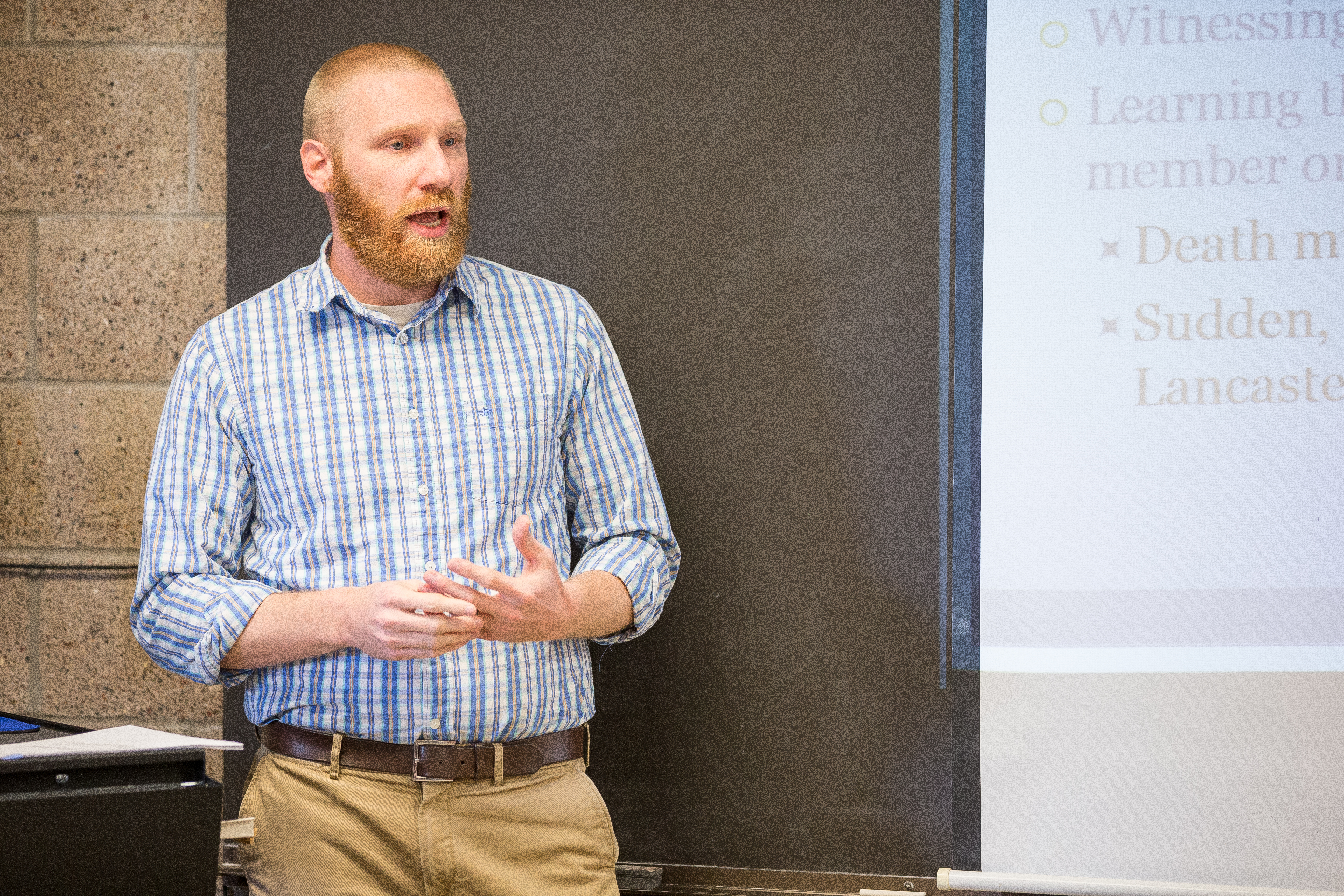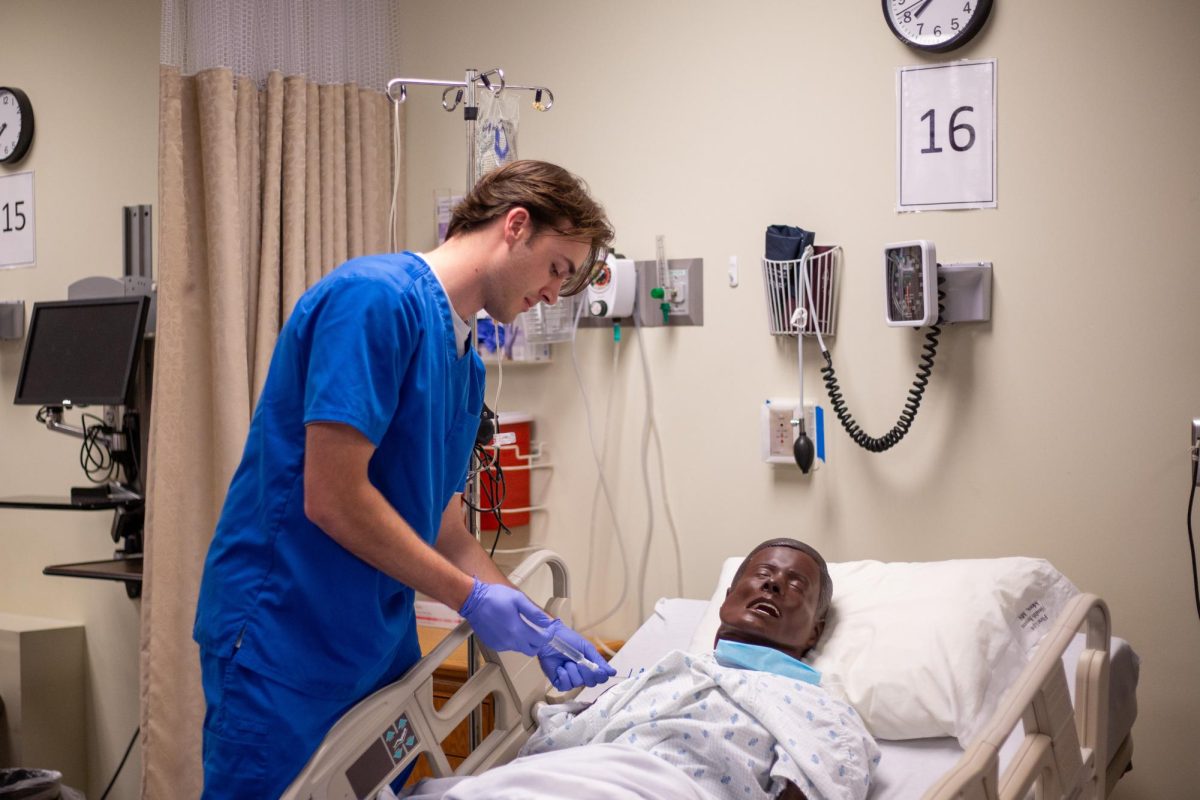
Steven Lancaster, Bethel Psychology Professor and Iraq Veteran, uses past experiences to spark new research for understanding Post Traumatic Stress Disorder (PTSD).
Christine Ramstad | Features Editor
Steven Lancaster is a big deal in the PTSD research world. Psychology professor at Bethel and Iraq war veteran, his past has become part of his future. Lancaster’s experiences in war provoked questions about the effects of traumatic events, but it wasn’t because those experiences were traumatic for him personally.
“I feel like I flourished there,” Lancaster said of his time in the military. “It gave me a chance to grow up while also learning that there are people who aren’t Christians who are good people. It was a very eye opening experience for me.”
Lancaster was deployed in the fall of 2003 and withdrew from classes during his senior year at Bethel. At the time, he felt unprepared for graduate school and his deployment didn’t derail any major plans.
Lancaster served as a Combat Engineer in Tuz Khormato, Iraq: a region where the Iraq/Iran War had occurred most heavily in the 1980’s.
After Iran pulled out of the violent conflict, thousands of explosive weapons — what are known today as Improvised Explosive Devices, IEDs — were left behind.
Lancaster’s mission was to find, gather, and destroy these weapons in order to protect civilians.
For civilians in this desperately poor area, the selling of the scrap metal from the bombs was a deadly source of income. “They would literally dig the explosives out of old bombs and occasionally they would go off… it was obviously very fatal when that happened,” Lancaster said.
The explosives were a readily available threat.
Lancaster remembers driving through fields and finding bombs scattered all around. He remembers the sound of gathered explosives rolling around in the back of the vehicle.
The explosives were gathered into piles and blown-up by Lancaster’s troop before ending up in the wrong hands.
“This was kind of a fun day,” Lancaster said while watching a video he took during a mission to destroy explosives left on a cart pulled by a donkey.
Someone had led their donkey, pulling a cart full of explosives, to the roadside and then released the donkey, who chose to stay by his cart. “This was designed to kill people specifically in tank vehicles. This was designed to kill us,” Lancaster said.
In a scene similar to a child playing with a remote control car, the troop operated a camera robot so they could inspect at a safe distance. On the camera was a fuse; ready to detonate once it was near the explosive-laden wagon.
“He’s just a donkey. He’s just hanging out,” Lancaster added moments before the confused, cart-loyal donkey is knocked over from the blast.
Though Lancaster was relatively comfortable during his time in service, he was struck by how negative the experience was for many of his troop members.
He remembers wondering how people could experience the same things and react so differently.
“Other people were really, really miserable and hated it. As for me, that wasn’t my experience at all,” Lancaster said. ‘I remember thinking ‘what’s going on here?’”
Lancaster remembers being impacted by a philosophy of science course he took while a Bethel student.
“It really opened my eyes to the idea that the thing we study in science has a lot to do with what’s going on in the field and within the broader social aspects,” Lancaster said. He began to analyze the ways in which psychology is, in part, a cultural phenomenon because of social factors that make particular theories and research possible. He cites money pouring into PTSD research because of the wars, as an example.
“He was a more serious student when he came back,” Psychology Department Chair, Joel Frederickson, recalled when Lancaster, his former student, returned from Iraq.
“He was a very good student before but he was quite focused when he came back,” Frederickson said. He also notes how impressed he is with the quality of research that Lancaster is doing.
After homecoming weekend at the beginning of October, fliers were all over campus advertising a free iPad for the first 30 people to arrive at Lancaster’s office.
“Dr. Lancaster comes into my office to show this to me and I burst out laughing,” Frederickson recalls about the moment Lancaster came to ask who had done it.
Turns out, Lancaster was a freshman RA and over the weekend his freshman residents were on campus for their 10 year reunion with a trick up their sleeve for their RA turned Professor.
“It was fantastic. It was hilarious,” Frederickson said through his laughter.
Lancaster’s current research is focused on the concept of Military Identity and its correlation to PTSD and Veterans’ welfare.
The question Lancaster is seeking to answer is this: Does the degree that someone associates themselves with the military indicate how they’re doing now?
Veteran clothing, veteran license plates, organizations, tattoos, bumper stickers, etc. can illustrate what strongly identifying with the military might look like on the outside. This type of group identification can be seen other places such as college campuses; however, Lancaster explains how the identification is seen on an entirely different level for people who have been in the military.
In his research of veterans, Lancaster has found an intense type of group identity called Identity Fusion.
“Identity fusion goes beyond the thought ‘I am apart of this group’ and goes to ‘I am the group and the group is me,’” Lancaster said.
Research shows that when identity fusion occurs, the affected individual is more likely to fight for the group and support extreme behavior. However, they are also more likely to help someone from the group who is in need. Lancaster has found that identity fusion is associated with positive outcomes – lower levels of anxiety and depression.
Lancaster is currently working on six different manuscripts headed for publication.
He is actively researching how military identity and the centrality of a traumatic event correlate with PTSD.
“It all goes back to how do people make sense of themselves and the world after bad events,” Lancaster said.
Bethel Senior, Garrett Anderson, is researching with Lancaster. They are conducting expressive writing experiments to learn more about the ways identity changes after a traumatic event.
“He doesn’t just give you [meaningless] work,” Anderson said. “He allows you to learn and he’s not afraid to critique you if you aren’t learning correctly.”
Lancaster is now a leading researcher in the psychology field – a path he never saw himself on before understanding what research really is.
“Research is not about statistics or methods. It’s about answering the questions you have about people and the world,” Lancaster said.




![Nelson Hall Resident Director Kendall Engelke Davis looks over to see what Resident Assistant Chloe Smith paints. For her weekly 8 p.m. staff development meeting in Nelson Shack April 16, Engelke Davis held a watercolor event to relieve stress. “It’s a unique opportunity to get to really invest and be in [RAs’] lives,” Engelke Davis said, “which I consider such a privilege.”](https://thebuclarion.com/wp-content/uploads/2024/05/041624_KendallEngelkeDavis_Holland_05-1200x800.jpg)
















